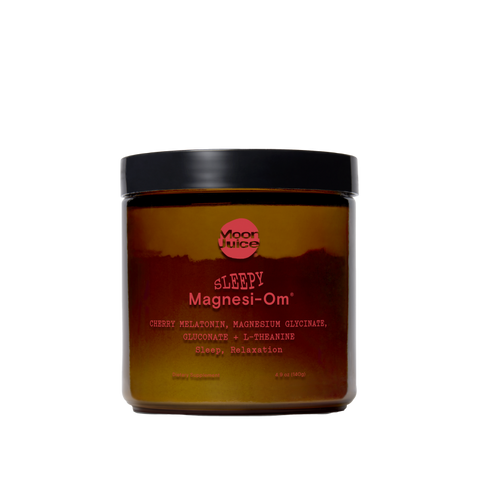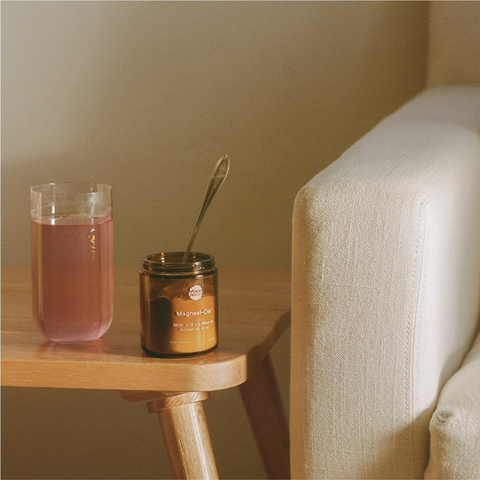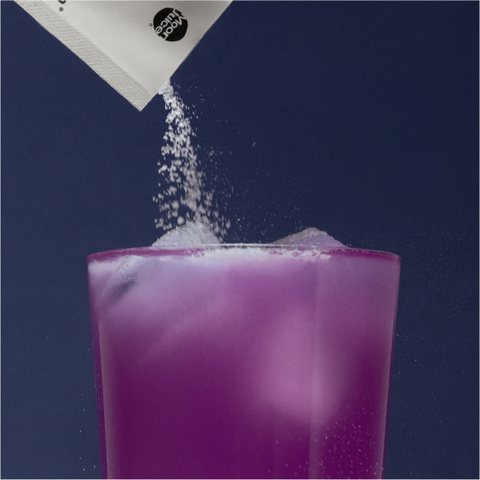Is a good night’s rest the stuff of dreams? If so, you’ve likely considered taking — or are currently taking — some type of sleep aid. Unfortunately, many prescription and over-the-counter sleep medications run the risk of dependence, grogginess, and a spate of undesired side effects. While a healthy diet and lifestyle, as well as a solid wind-down routine, can go a long way to help you achieve good sleep, sometimes natural supplements aid can make the endeavor easier. Enter vitamins and supplements for sleep that promote rest sans medications and wonky side effects.
Keep reading to discover the best vitamins and supplements for sleep that you can take during your wind-down time before bed.
1. Melatonin
Melatonin is arguably the most famous sleep supplement available. Not only is it often the first line of defense against sleepless nights, but also a naturally occurring substance the human body makes on its own. Famously known as the sleep hormone, melatonin production peaks at nightfall and ceases during the daylight hours as long as this natural flow goes undisturbed. (Light sources — including those from lamps, smartphones, and TV — can halt melatonin production, thus prompting you to stay wakeful instead of snoozy before bedtime.)
Melatonin supplements and melatonin-rich foods help boost hormone levels in the body, helping to promote healthy sleep. Although they’re well-known for helping you fall asleep fast, a 2013 meta-analysis of 19 studies published in the journal PLoS One found that supplemental melatonin can also increase the time you stay asleep and significantly improve sleep quality. As such, it’s no surprise that they’re amongst the best supplements for managing sleep problems you can find.
However, there can be too much of a good thing. High doses of melatonin, typically at 1mg to 5mg, can flood brain receptors and overwhelm your system with up to 100 times more of the hormone in your blood. The result is that melatonin can cause grogginess, fogginess, and a hangover feeling that’s hard to shake off the next day. To avoid this sluggishness while still experiencing the benefits of melatonin, start off with as low of a melatonin dosage as possible and consider microdosing the sleep aid instead. Instead of taking melatonin every night, consider taking it on an as-needed basis to promote restful sleep.
2. Magnesium
Magnesium is an essential mineral necessary for countless functions and processes, including but not limited to:
- Regulating blood sugar
- Bolstering brain health
- Promoting a balanced mood
- Facilitating regular bowel movements
- Supporting sleep
In short, every cell in the human body needs Magnesium to function properly. While you can get it from your diet, over half of people in the United States still suffer from a magnesium deficiency. Add to that the fact that a whopping 50 to 70 million Americans have ongoing sleep issues, and you’ll see that taking a Magnesium powder supplement can be one of the best ways to promote sleep and overall well-being.
According to a 2023 review published in the journal Biological Trace Element Research, observational studies show a positive association between magnesium status and several markers of sleep, including:
- Sleepiness
- Sleep duration
- Sleep quality
That said, more research is necessary to conclude that magnesium is generally effective for insomnia, low mood, and stress — the latter two of which can absolutely contribute to sleepless nights.
It’s also worth noting that not all types of magnesium are created equally. Certain types are more bioavailable than others, and different forms can offer different benefits. For instance, Magnesium Glycinate is a popular form of the mineral since it’s readily bioavailable and easy on your digestive system. Better yet, it’s one of the best types of magnesium to take before bed. Research shows that Glycine — an amino acid that, when paired with Magnesium salt, creates Magnesium Glycinate — can enhance sleep quality and neurological functions.
3. Chamomile
Chamomile, typically in the form of tea, is amongst the best supplements for sleep, given its rapid effects. It boasts robust evidence backing up its powers to reduce the time it takes to fall asleep. For most, it kicks in within an hour or less to help you drift off into dreamland, making it a great natural remedy if you struggle to fall asleep.
A 2019 meta-analysis published in the journal Phytotherapy Research also found that chamomile led to significant improvements in sleep quality. Moreover, it was concluded to be efficacious and safe to mitigate symptoms of anxiety, which can help those who toss and turn in bed due to rumination and worry.
4. L-Theanine
Another one of the best supplements for sleep-related to tea is L-Theanine. A natural compound found in green tea, L-Theanine is an amino acid that promotes a sense of calm and relaxation. Per a 2015 review in the Journal of the American College of Nutrition, this natural aid promotes better sleep quality through anxiolysis (i.e., reducing anxiety) rather than sedation. In other words, it helps you feel at ease so you can easily settle into a dreamier, sleepier state — without experiencing drowsiness or waking up to a foggy hangover like a strong melatonin supplement can sometimes do.
More recently, a 2023 randomized, placebo-controlled, double-blind trial published in the journal Nutrients investigated the effects of 200mg supplementation of L-Theanine in adult participants with no major psychiatric illness. Within 4 weeks of daily intake, the L-Theanine group improved their scores for:
- Sleep latency (i.e., the time it takes to fall asleep)
- Sleep disturbance
- Use of sleep medication
In addition, the researchers concluded that L-Theanine has the potential to promote mental health, mitigate stress, and support cognition in the general population. As such, it’s well worth adding to your stress management toolkit should you need the extra support.
5. Vitamin D
Commonly known as the sunshine vitamin, Vitamin D isn’t necessarily the best vitamin for sleep, however, lacking it might be one thing standing in your way of achieving good sleep every night. A 2018 meta-analysis of 9 studies published in the journal Nutrients shows that a deficiency of the vitamin — which is among the most common micronutrient deficiencies worldwide — are associated with:
- Poor sleep quality
- Short sleep duration
- General sleepiness
- A higher risk of developing sleep disorders
Vitamin D isn’t only beneficial for avoiding sleep issues. It’s also crucial for everything from balancing the immune response and offering neuroprotection to supporting muscle function.
Getting a bit of sunshine in the morning offers the dual benefits of boosting your levels of the vitamin and helping to regulate circadian rhythms (aka your sleep-wake cycles). In case this isn’t an option or you know that your Vitamin D levels are lower than they should be, you can always opt for an immune-supporting supplement that includes it.
6. Vitamin C
Although many people associate Vitamin C with supporting the immune system, it just so happens to be among the top vitamins for sleep. A 2020 review in the journal Nutrients concluded that Vitamin C supplementation has the potential to:
- Increase sleep duration
- Reduce sleep disturbances
- Help treat movement disorders contributing to disrupted sleep
- Reduce risks that can result from sleep apnea
Similar to Vitamin D, this popular vitamin and antioxidant won’t exactly make you knock out like a light with one-and-done supplementation. However, elevating your levels consistently over time can be an effective way to get more high-quality shut-eye and reverse your sleep problems. All the while, upping your Vitamin C intake will bolster your first line of defense for cellular health for healthy immune function.

The Takeaway
While many people rely on pharmaceuticals and sleep medicine for their sedative effects — and sometimes even natural aids, like melatonin, at high dosages — it’s best to opt for gentle yet effective vitamins and supplements for sleep. Some will work on the spot for fast-acting relief, while other sleep supplements will require longer-term supplementation. If you want to avoid waking up to fatigue and grogginess, prioritize natural, research-backed nutrients that promote calm and relaxation instead of flat-out sedation.
Some of the best supplements for sleep will include a mix of the natural ingredients above to facilitate better sleep on several fronts. Take, for example, Sleepy Magnesi-Om®. This sleep powder supplement supports slumber by decreasing the time it takes to fall asleep and promoting sleep quality — as well as supports muscle relaxation and the body’s stress response — courtesy of:
- Phytomelatonin, extracted from organic alfalfa and chlorella, at a microdose of 0.3mg to support healthy Melatonin levels in the body
- Chelated magnesium bisglycinate and gluconate
- L-theanine
Available in an organic blackberry flavor with zero sugar, this all-natural, sippable supplement is a tasty antidote to situational sleeplessness. Keep it on hand if you’re traveling (and need to reduce the pangs of jet lag), just did a night shift, or simply dealing with a mild bout of insomnia. Mix 1 packet of this melatonin and magnesium powder for sleep with 12 oz of water within an hour or two before bedtime. The plant-based, non-habit-forming sleep tonic will help put your mind and body at ease so you can fall asleep soon after your head hits the pillow.
Sources
- Ferracioli-Oda E, Qawasmi A, Bloch MH. Meta-analysis: melatonin for the treatment of primary sleep disorders. PLoS One. 2013 May 17;8(5):e63773. doi: 10.1371/journal.pone.0063773. PMID: 23691095; PMCID: PMC3656905. https://pubmed.ncbi.nlm.nih.gov/23691095/
- Tordjman, Sylvie et al. “Melatonin: Pharmacology, Functions and Therapeutic Benefits.” Current neuropharmacology vol. 15,3 (2017): 434-443. doi:10.2174/1570159X14666161228122115 https://www.ncbi.nlm.nih.gov/pmc/articles/PMC5405617/
- Oregon State University, Micronutrient Inadequacies in the US Population: an Overview https://lpi.oregonstate.edu/mic/micronutrient-inadequacies/overview
- NIH, What Are Sleep Deprivation and Deficiency? https://www.nhlbi.nih.gov/health/sleep-deprivation
- Arab A, Rafie N, Amani R, Shirani F. The Role of Magnesium in Sleep Health: a Systematic Review of Available Literature. Biol Trace Elem Res. 2023 Jan;201(1):121-128. doi: 10.1007/s12011-022-03162-1. Epub 2022 Feb 19. PMID: 35184264. https://pubmed.ncbi.nlm.nih.gov/35184264/
- Razak MA, Begum PS, Viswanath B, Rajagopal S. Multifarious Beneficial Effect of Nonessential Amino Acid, Glycine: A Review. Oxid Med Cell Longev. 2017;2017:1716701. doi: 10.1155/2017/1716701. Epub 2017 Mar 1. Erratum in: Oxid Med Cell Longev. 2022 Feb 23;2022:9857645. PMID: 28337245; PMCID: PMC5350494. https://pubmed.ncbi.nlm.nih.gov/28337245/
- Hieu TH, Dibas M, Surya Dila KA, Sherif NA, Hashmi MU, Mahmoud M, Trang NTT, Abdullah L, Nghia TLB, Y MN, Hirayama K, Huy NT. Therapeutic efficacy and safety of chamomile for state anxiety, generalized anxiety disorder, insomnia, and sleep quality: A systematic review and meta-analysis of randomized trials and quasi-randomized trials. Phytother Res. 2019 Jun;33(6):1604-1615. doi: 10.1002/ptr.6349. Epub 2019 Apr 21. PMID: 31006899. https://pubmed.ncbi.nlm.nih.gov/31006899/
- Rao TP, Ozeki M, Juneja LR. In Search of a Safe Natural Sleep Aid. J Am Coll Nutr. 2015;34(5):436-47. doi: 10.1080/07315724.2014.926153. Epub 2015 Mar 11. PMID: 25759004. https://pubmed.ncbi.nlm.nih.gov/25759004/
- Hidese S, Ogawa S, Ota M, Ishida I, Yasukawa Z, Ozeki M, Kunugi H. Effects of L-Theanine Administration on Stress-Related Symptoms and Cognitive Functions in Healthy Adults: A Randomized Controlled Trial. Nutrients. 2019 Oct 3;11(10):2362. doi: 10.3390/nu11102362. PMID: 31623400; PMCID: PMC6836118. https://pubmed.ncbi.nlm.nih.gov/31623400/
- Gao Q, Kou T, Zhuang B, Ren Y, Dong X, Wang Q. The Association between Vitamin D Deficiency and Sleep Disorders: A Systematic Review and Meta-Analysis. Nutrients. 2018 Oct 1;10(10):1395. doi: 10.3390/nu10101395. PMID: 30275418; PMCID: PMC6213953. https://www.mdpi.com/2072-6643/10/10/1395
- Mayo Clinic, Vitamin D https://www.mayoclinic.org/drugs-supplements-vitamin-d/art-20363792
- Otocka-Kmiecik, Aneta, and Aleksandra Król. “The Role of Vitamin C in Two Distinct Physiological States: Physical Activity and Sleep.” Nutrients vol. 12,12 3908. 21 Dec. 2020, doi:10.3390/nu12123908 https://www.ncbi.nlm.nih.gov/pmc/articles/PMC7767325/














